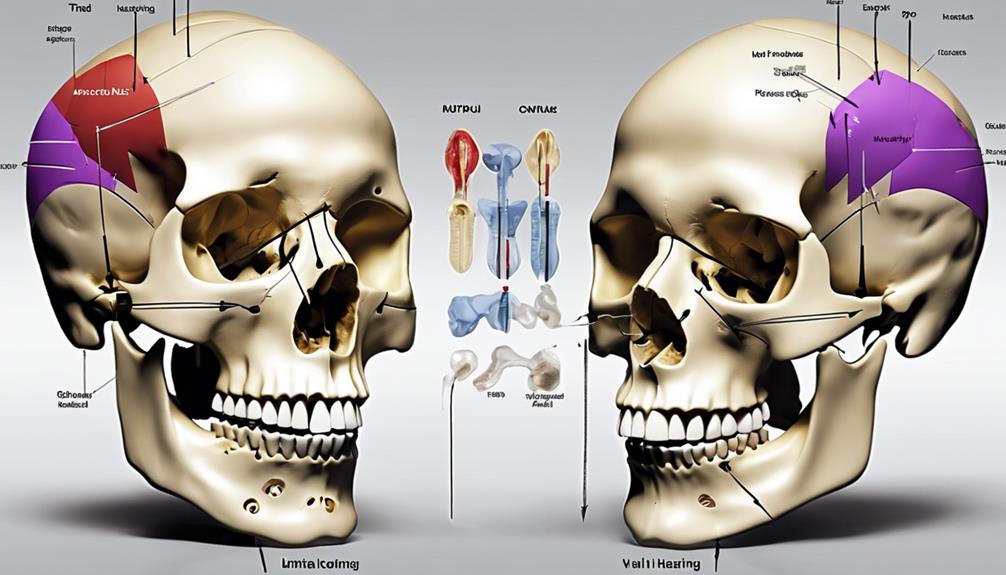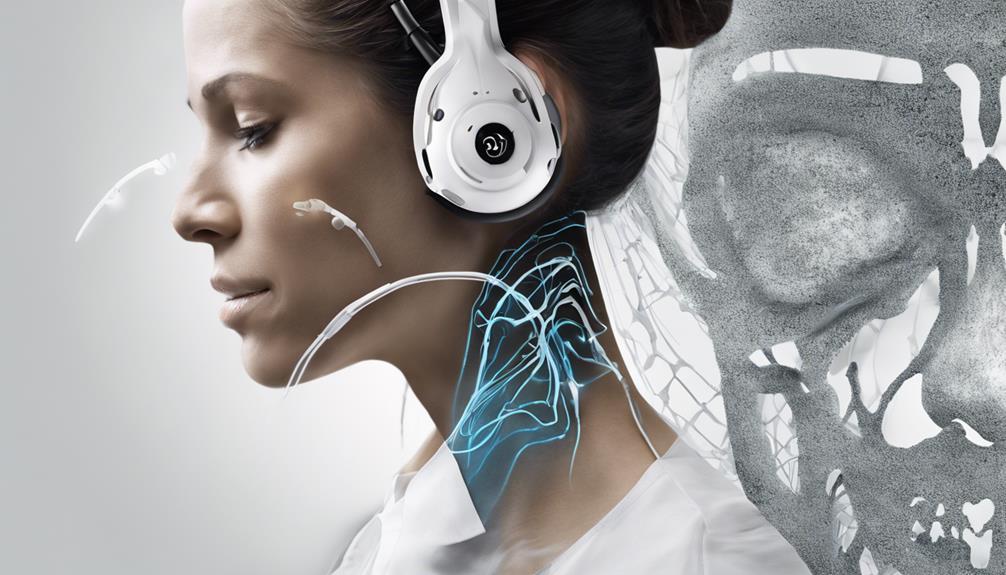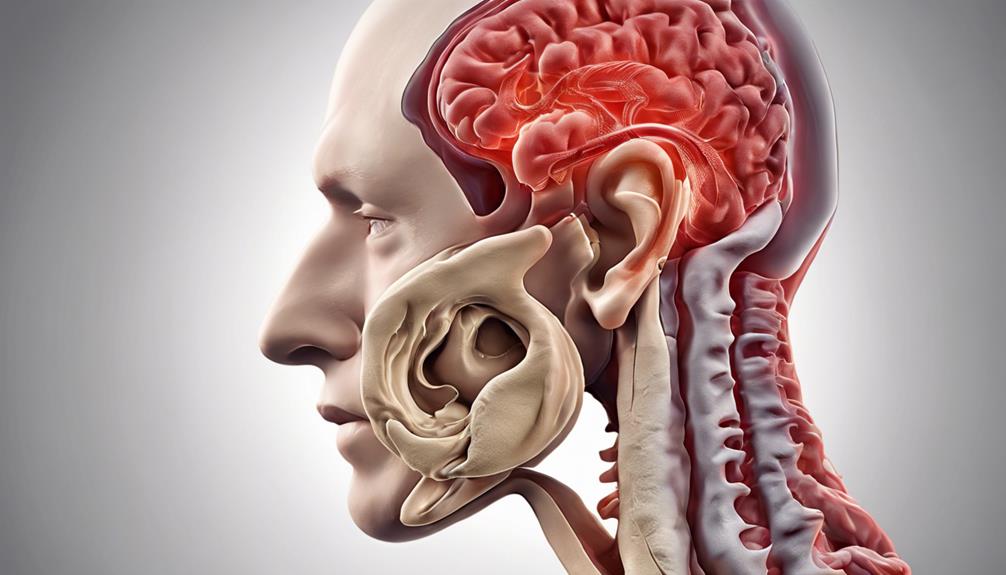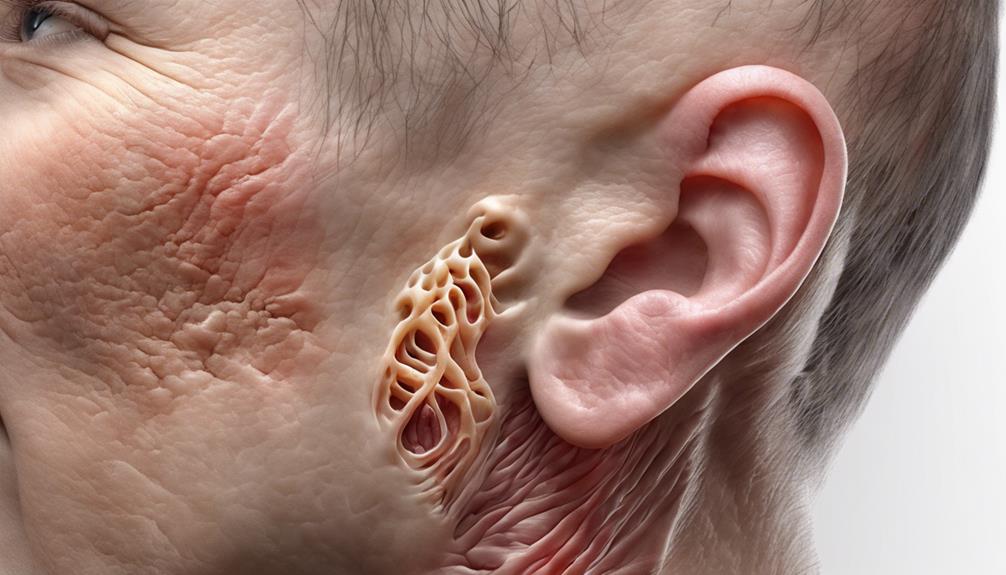Have you ever considered how an issue with your jaw could affect your ability to hear clearly?
The intricate connection between temporomandibular joint disorder (TMJ) and hearing loss is a topic worth exploring.
Understanding the mechanisms behind this unexpected relationship can shed light on the importance of early detection and management.
Let's unravel the complexities of how TMJ can impact your hearing and what steps can be taken to address this multifaceted issue.
Key Takeaways
- TMJ disorder affects hearing via nerve compression and middle ear pressure.
- Symptoms of TMJ-related hearing loss include tinnitus and reduced sensitivity.
- Diagnostic methods involve physical exams, imaging, and hearing tests for evaluation.
- Treatment includes oral appliances, pain management, and specialist consultations for tailored care.
Mechanisms of TMJ-Induced Hearing Loss
Indirectly affecting the auditory system, TMJ disorder can intricately disrupt the mechanisms responsible for hearing function through various pathways. When the jaw is misaligned due to TMJ issues, it can lead to pressure or swelling that impacts the structures of the middle ear, causing disturbances in sound transmission. Nerve compression resulting from TMJ misalignment further complicates matters by interfering with the normal transmission of auditory signals.
The consequences of TMJ-related hearing loss are diverse, with symptoms such as tinnitus, ear fullness, and reduced hearing sensitivity manifesting in affected individuals. Inflammation in the jaw muscles can have a cascading effect on nearby nerves and muscles involved in hearing, exacerbating the issue. These disruptions in the auditory system highlight the intricate relationship between the temporomandibular joint and hearing function, emphasizing the need for comprehensive management strategies to address both the dental and auditory aspects of TMJ disorder.
Diagnostic Methods for TMJ Hearing Loss

When assessing TMJ-related hearing loss, diagnostic methods focus on conducting a physical examination and reviewing the patient's medical history to pinpoint specific symptoms indicative of the condition.
Checking for jaw stiffness and abnormal sounds during the examination can aid in diagnosing TMJ-related hearing issues. Additionally, confirmation of TMJ problems often involves the use of imaging techniques such as X-rays to assess the jaw joint for any structural abnormalities that may be impacting hearing.
Hearing tests play a crucial role in evaluating the extent of hearing loss associated with TMJ disorder, helping specialists understand the severity of the condition. Comprehensive evaluations by specialists are necessary to determine the impact of TMJ on hearing and to develop appropriate treatment plans tailored to the individual's needs.
Treatment Approaches for TMJ-Related Hearing Loss
Treatment approaches for TMJ-related hearing loss typically involve a combination of oral appliances, pain management options, and specialized interventions tailored to the individual's condition and severity. Dental splints and nightguards are commonly used oral appliances to help align the jaw and alleviate TMJ disorder symptoms that may contribute to hearing issues.
Pain management strategies such as nonsteroidal anti-inflammatory drugs (NSAIDs) or muscle relaxants can assist in reducing discomfort associated with TMJ-related hearing loss. In more severe cases, Platelet Rich Plasma (PRP) injections may be considered to promote healing and alleviate symptoms.
A crucial step in the treatment process is a thorough evaluation by specialists to determine the most suitable approach for each individual. Adopting a multidisciplinary approach involving dental, medical, and audiological professionals is essential for effectively managing TMJ-related hearing loss and addressing the underlying causes comprehensively.
Understanding the TMJ-Hearing Connection
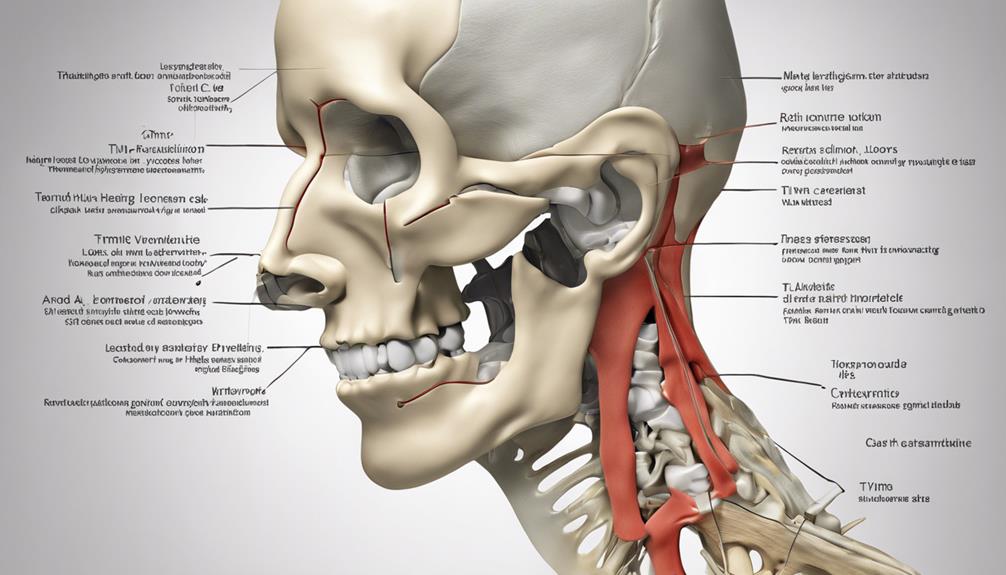
Probing the intricate connection between temporomandibular joint (TMJ) dysfunction and hearing impairment reveals a compelling interplay between these seemingly disparate bodily systems. Understanding the TMJ-hearing connection sheds light on the complex mechanisms that can lead to hearing loss caused by TMJ disorders.
- The jaw's proximity to the ear can impact the delicate structures involved in hearing, such as the eustachian tubes.
- Symptoms of TMJ, including muscle tension and inflammation, can directly affect auditory function.
- Temporomandibular Joint Disorders may disrupt neural pathways and muscle function crucial for proper hearing.
- TMJ-related hearing loss can occur due to inflammation and nerve compression affecting sound transmission pathways in the middle ear.
Preventive Strategies for TMJ Hearing Issues
Exploring effective preventive strategies for addressing TMJ-related hearing issues is crucial for maintaining optimal auditory health and overall well-being. Regular dental check-ups play a vital role in the early detection of TMJ disorders, potentially averting hearing loss complications.
Incorporating stress management techniques into daily routines can help alleviate jaw tension, mitigating the impact on hearing. Avoiding excessive jaw movements and maintaining proper posture are essential in preventing the exacerbation of TMJ-related hearing problems.
Prompt medical evaluation for symptoms like ear fullness or tinnitus is imperative for timely intervention in managing TMJ-related hearing issues. By integrating these preventive strategies into one's lifestyle, individuals can effectively manage and potentially reduce the impact of TMJ on hearing health.
Prioritizing preventive measures not only safeguards against hearing complications but also promotes overall well-being in the face of TMJ disorders.
Frequently Asked Questions
How Does TMJ Cause Hearing Loss?
When TMJ causes hearing loss, it typically impacts the middle ear due to its proximity and shared neural pathways. Inflammation and swelling from TMJ can disrupt middle ear structures, leading to impaired sound transmission. Additionally, nerve compression resulting from jaw misalignment in TMJ can affect auditory signal transmission.
Symptoms of TMJ-related hearing loss may include ear fullness, tinnitus, and reduced hearing sensitivity. Proper diagnosis and treatment of TMJ are essential to prevent worsening hearing problems.
How Do You Unblock Your Ear From Tmj?
To unblock ears affected by TMJ, we can employ various strategies. Jaw exercises, warm compresses, and over-the-counter ear drops are effective.
Seeking guidance from dental or ENT professionals is crucial for tailored solutions. Incorporating relaxation techniques aids in reducing jaw tension and enhancing ear function.
It's vital to address TMJ-related ear blockages promptly to promote overall well-being and alleviate discomfort.
Can TMJ Cause Pressure in the Ears?
Yes, TMJ can cause pressure in the ears due to inflammation and swelling near the jaw joint. This pressure can lead to Eustachian tube dysfunction, resulting in a feeling of fullness or discomfort in the ears.
The increased pressure in the temporomandibular joint area can also affect the surrounding ear structures, potentially contributing to symptoms like tinnitus and changes in hearing.
Addressing TMJ issues can help alleviate ear pressure and associated discomfort.
Is TMJ a Lifelong Condition?
Yes, TMJ can be a lifelong condition due to chronic issues with the jaw joint. Long-term misalignment or damage in the temporomandibular joint can lead to persistent symptoms.
Effective management strategies and treatments can help control TMJ over time. Lifestyle modifications and regular monitoring may be necessary for managing TMJ as a lifelong condition.
Consulting with healthcare providers and specialists can provide ongoing support for living with TMJ.
Conclusion
In conclusion, managing TMJ symptoms is crucial in preventing the progression of hearing loss. Just as a skilled conductor orchestrates a symphony, addressing TMJ-related issues promptly can help maintain harmony in our auditory system.
By understanding the mechanisms, diagnostics, and treatment options available for TMJ-induced hearing loss, individuals can take proactive steps to preserve their hearing health and overall well-being.
Stay informed, stay vigilant, and protect your precious gift of hearing like a maestro guiding a masterpiece.

